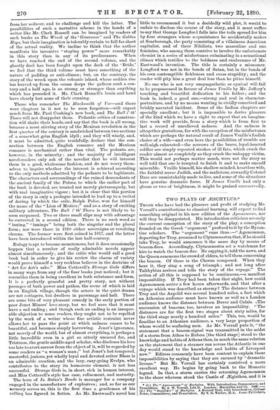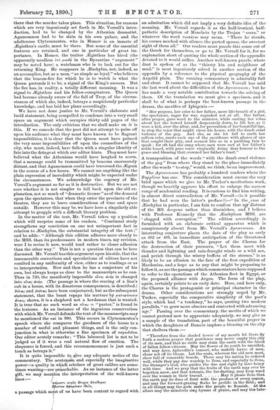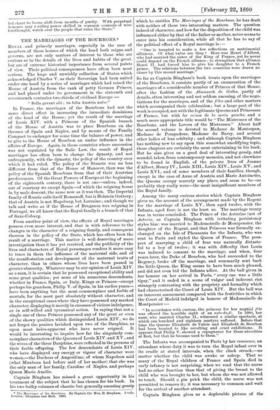TWO PLAYS OF 1ESCHYLUS
THOSE who have had the pleasure and profit of studying Mr. Verrall's contributions to classical learning, will expect to find something original in his new edition of the Agamemnon, nor will they be disappointed. His introduction criticises severely the current conception of the story of the play, a conception founded on the Greek "argument " prefixed to it by the Byzan- tine scholars. The " argument" runs thus :—" Agamemnon, departing for Troy, promised to Clytamnestra that, if he should take Troy, he would announce it the same day by means of beacon-fires. Accordingly, Clytremnestra set a watchman for hire to watch the beacon-fire. He espying it, told the news, and the Queen summons the crowd of elders, to tell them concerning the beacon. Of these is the Chorus composed. When they hear it, they sing a song of triumph ; and not long after Talthybius arrives and tells the story of the voyage." The action of all this is supposed to be continuous,—a manifest impossibility. If Troy had been taken that night, how could Agamemnon arrive a few hours afterwards, and that after a voyage which was described as stormy P The distance between Troy and the Argolid was several hundred miles, a fact which an Athenian audience must have known as well as a London audience knows the distance between Dover and Calais. -.The succession of beacons, too, involves an impossibility. "The distances are for the first two stages about sixty miles, for the third stage nearly a hundred miles." This, too, would be familiar to an Athenian audience, a very large proportion of whom would be seafaring men. As Mr. Verrall puts it, "the statement that a beacon-signal was transmitted in the midst of a storm from Athos to Eubcea [the third stage] stood to the knowledge and habits of Athens then, in much the same relation as the statement that a steamer ran across the Atlantic in one day would stand to the knowledge and habits of Liverpool now." Editors commonly have been content to explain these impossibilities by saying that they are excused by " dramatic license." But Mr. Verrall has certainly contrived a more excellent way. He begins by going back to the Homeric legend. In that, a storm carries the returning Agamemnon to the shore whereon stood the Castle of ]gisthus, and it is
• (1.) The " Agamemnon" of Rachylus. With Introduction, Commentary, and Translation. By A. W. Verrall, Litt.D. London : Macmillan and Co.
(2.) The " Suppliees" of dischylus. A Revised Teat, with Introduction, Critical Notes, Commentary, and Translation. By T. G. Tucker, ILL. Came Publishers. there that the murder takes place. This situation, for reasons which are very ingeniously set forth in Mr. Verrall's intro- duction, had to be changed by the Athenian dramatist. Agamemnon had to be slain in his own palace, and the adulterous Clytmmnestra„ who in Homer is an inmate of Egisthus's castle, must be there. But some of the essential features are retained, and one in particular of great im- portance. In Homer, the traitor /Egisthus has hired (the apparently needless inr puegiZI in the Byzantine " argument" may be noted here) a watchman who is to look out for the returning King. He reappears in /Eschylus, not, indeed, as an accomplice, but as a man, " as simple as loyal," who believes that the beacon-fire for which he is to watch is what the Queen pretends it to be, a signal of the King's success. But the fire has, in reality, a totally different meaning. It was a signal to ./Egisthus and his fellow-conspirators. The Queen had become already aware of the fall of Troy, of the circum- stances of which she, indeed, betrays a suspiciously particular knowledge, and has laid her plans accordingly.
We have not done justice to Mr. Verrall's elaborate and lucid statement, being compelled to condense into a very small space an argument which occupies thirty odd pages of the introduction. The only criticism that we shall make on it is this. If we concede that the poet did not attempt to palm off upon his audience what they must have known to be flagrant impossibilities, it is clear that the Queen must have palmed the very same impossibilities off upon the counsellors of the city, who must, indeed, have fallen with a singular identity of fate into the dotage at which our editor hints. They must have believed what the Athenians would have laughed to scorn, that a message could be transmitted by beacons enormously distant, and that Agamemnon could have traversed the /Egean in the coarse of a few hours. We cannot see anything like the plain expression of incredulity which might be expected under the circumstances. We acknowledge the cogency of Mr. Verrall's argument so far as it is destructive. But we are not sure whether it is not simpler to fall back upon the old ex- planation, not so much of "dramatic license" as of the demand upon the spectators, that when they enter the precincts of the theatre, they are to leave considerations of time and space outside. However this may be, we have here a singularly able attempt to grapple with a difficult literary problem.
In the matter of the text, Mr. Verrall takes up a position which will surprise some of his readers. "Continual study strengthens my conviction on one not unimportant fact in relation to Aschylus, the substantial integrity of the text ;" and he adds : " Although this edition adheres more closely to the MSS. than its predecessors in modern times, my revision, were I to revise it now, would tend rather to closer adhesion than the other way." This is not a question that can be here discussed. Mr. Verrall has this argument upon his side, that the innumerable corrections and speculations of editors have not resulted in any uniformity of view, either as to readings or as to interpretation. Now and then he has a conjecture of his own, but always keeps as close to the manuscripts as he can. Thus in 720, the manifestly impossible oi.ro; oiyip is changed into clings seep. (The passage is where the rearing of a lion's cub in a house, with its disastrous consequences, is described.) Boras and Aiming; have been conjectured; but as the subsequent statement, that the beast repays his nurture by tAnAo0vourry I:17ms, shows, it is a shepherd not a herdsman that is wanted. It is true that no such word as orras = " pastor," is found in the lexicons. • As an instance of the ingenious conservatism with which Mr. Verrall defends the text of the manuscripts may be mentioned the zed in 890. This occurs in Clytcemnestra's speech where she compares the goodman of the house to a number of useful and pleasant things, and is the only con- junction in what is otherwise a fine specimen of asyndeton. Our editor acutely remarks : " This laboured list is not to be judged as if it were a real natural flow of emotion. The eloquence is forced, and this recommencement is just such a touch as betrays it."
It is quite impossible to give any adequate notice of the commentary. The acuteness, and especially the imaginative power—a quality in which scholars of great calibre are some- times wanting—are remarkable. As an instance of the latter gift, we may mengon the interpretation of the well-known lines
IrcipeeTt (mils iTgpos laoiaopos 25167e5 asbelAircom 13e1v,
a passage which mist of us have been content to regard with
an admiration which did not imply a very definite idea of the meaning. Mr. Verrall regards it as the half-ironical, half- pathetic description of Menelaus by the Trojan " seers," or whatever the word wpockrai may mean. "There he stands, his curses mocked with silence, the parted spouse, the sweetest sight of them all." Our readers must puzzle this sense out of the Greek for themselves, or go to Mr. Verrall for it, for no explanation short of quoting the whole section of the appendix devoted to it would suffice. Another well-known puzzle, where- dust is spoken of as the "thirsty kin and neighbour of
mud," is most ingeniously solved in another section of the appendix by a reference to the physical geography of the Argolid plain. The running commentary is admirably fall and clear. It cannot be supposed that Mr. Verrall has said the last word about the difficulties of the Agamemnon; but he
has made a very notable contribution towards the solving of them. Of the translation we must give a specimen, and it shall be of what is perhaps the best-known passage in the- drama, the sacrifice of Iphigenia :—
" Her prayers, her cries to her father, mere life-breath of a girl, the spectators, eager for war, regarded not at all. Her father, after prayer, gave word to the minister, while casting her robes. about her she bowed herself desperately down, to lift her, as it were a kid, over the altar, and, for prevention of her beautiful lips, to stop the voice that might curse his house, with the dumb cruel violence of the gag. And she, as she let fall to earth her saffron robe, smote each one of the sacrificers with glance of eye that sought their pity, and seemed like as in a painting fain to speak : for oft had she sung where men were met at her father's noble board, with pure voice virginally doing dear honour to the grace and blessing that crowned her father's feast."
A transposition of the words " with the dumb cruel violence of the gag" from where they stand to the place immediately after the words " to stop," would, we think, be an improvement.
The Agamemnon has probably a hundred readers where the Supplices has one. This consideration must excuse the very
brief space which we give to Mr. Tucker's meritorious work, though we heartily approve his effort to enlarge the narrow range of academical reading. It is curious to find him writing, in almost direct contradiction of Mr. Verrall—(is it possible that he had seen the latter's prefacer')—" In the case of Aschylus in particular, I am fain to confess that my distrust of the MS. deepens rather than diminishes, and I believe
with Professor Kennedy that the lEschylean MSS. are clogged with corruption." The edition accordingly is furnished with an elaborate critical apparatus which is conspicuously absent from Mr. Verrall's Agamemnon. An
interesting conjecture places the date of the play as early as 492 or 491, in immediate anticipation of the threatened attack from the East. The prayer of the Chorus for the destruction of their pursuers, "Let them meet with thunder and lightning and rain-fraught winds or a wild sea, and perish through the wintry buffets of the storms," is as likely to be an allusion to the fate of the first expedition of Mardonius, and a hope as to any that might be preparing to follow it, as are the passages which commentators have supposed to refer to the operations of the Athenian fleet in Egypt, or the proposed alliance with Argos. The form of the play, again, certainly points to an early date. Here, and here only, the Chorus is the protagonist or principal character in the drama. Other considerations are strongly urged by Mr. Tucker, especially the comparative simplicity of the poet's style, which had " a tendency," he says, quoting two modern parallels, " to grow more obscure and contorted with advancing age." Passing over the commentary, the merits of which we
cannot pretend now to appreciate adequately, we may give as a sample of the translation, part of the beautiful prayer in which the daughters of Danaiis implore a blessing on the city
that shelters them :—
" Therefore from the shaded bower of my mouth let there fly forth a zealous prayer that pestilence may never empty this city of its men, and that no strife may stain the earth with the blood of fallen fellow-citizens. May the flower of its youth be uncoiled, and may Ares, Aphrodite's consort, who maketh havoc of men, shear not off its bloom. Let the seats, whereon the old men meet, show full of venerable beards. There may the nation be ordered well while they pay due worship to Zeus, and especially to Zeus, the Stranger's God, who guides the due and right by laws hoary with time. And we pray that the fruits of the earth may ever be begotten anew, and that Artemis, the far-darting, may keep ward over the women in their travail May it please Zeus that the earth pay its dues of fruit with the produce of every season, and may the forward-grazing flocks be prolific in the field; and in all things may the gods make the people to flourish. At the altars may the minstrels sing hymns of praise, and may the lute-
led chant be borne aloft from mouths of purity. With perpetual honours may a ruling power skilled in common counsels of wise forethought, watch over the people that rules the State."








































 Previous page
Previous page